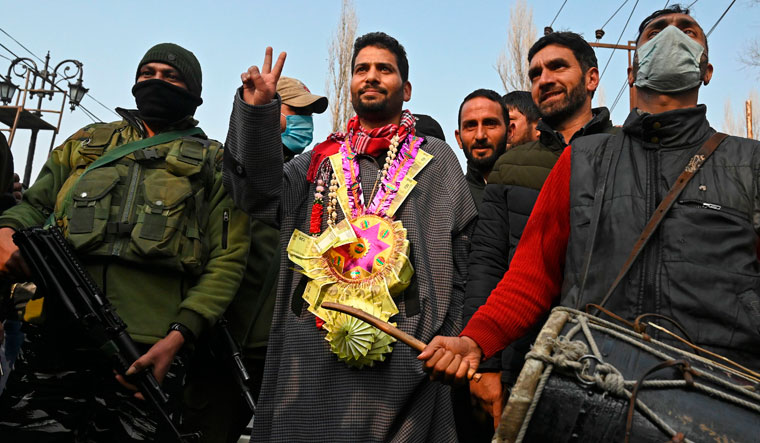As expected, the recent District Development Council (DDC) elections in Jammu and Kashmir turned out to be a direct fight between the BJP and the People’s Alliance for Gupkar Declaration, better known as the Gupkar Alliance. The 280 DDC seats—14 each in 20 districts—were created after the Union government amended the J&K Panchayati Raj Act in October. The Gupkar Alliance of seven regional parties fought the elections on the plank of reinstating Article 370 of the Constitution. The BJP, on the other hand, said its policies helped integration of Jammu and Kashmir with the rest of the country, opened up opportunities for development and ended political discrimination against refugees and women married to outsiders.
The two divergent narratives were duly reflected in the election results, with the Kashmir valley firmly siding with the Gupkar Alliance, and Jammu voting the BJP. The results have laid bare the deep communal polarisation J&K has undergone after the administrative and constitutional changes introduced by the Narendra Modi government in 2019.
The Gupkar Alliance won 110 seats, the BJP 74, independents 43 and the Congress 26. The alliance—comprising the National Conference, the People’s Democratic Party, the J&K People’s Conference, the CPI(M), the Awami National Conference, the J&K People’s Movement and the Awami Ittehad—won nine districts, all of them in the valley. The BJP won a majority in six districts in the Jammu region, despite the National Conference putting up a tough fight. It swept the districts of Jammu, Udhampur, Kathua and Samba, repeating its performance in the 2014 assembly polls and the 2019 general elections.
The BJP also won eight seats in Doda district and seven in Reasi. The party opened its account in the valley for the first time, bagging three seats—Khanmoh-II in Srinagar, Tulail in Bandipora and Kakapora in Pulwama. The Congress once again failed to make an impression. The Jammu and Kashmir Apni Party, launched by former PDP leader Altaf Bukhari with the backing of the Union government, won just 10 seats. The National Conference emerged the key player in the alliance by winning 67 seats, and the PDP came second with 27 seats.
Both the alliance and the BJP claimed victory. Union Minister Jitendra Singh said the results showed that the BJP was “acceptable”to the people of both regions of the Union territory. “Three BJP candidates have won from Kashmir,” he said. “It is a testimony to the fact that the people of Jammu and Kashmir believe in Prime Minister Narendra Modi’s vision for the development of the Union territory.”
National Conference vice president and former chief minister Omar Abdullah said he understood the BJP’s temptation to overplay the three seats it won in the valley, but asked why the party was underplaying the 35 seats his party won in Jammu. “People from Jammu as well as Kashmir have extended complete support to the Gupkar Alliance and have endorsed its plan to seek the restoration of Jammu and Kashmir’s special status by giving a befitting reply to the BJP,”he said. PDP president Mehbooba Mufti tweeted that the alliance cadre worked tirelessly to ensure its success and that the people of J&K rejected the unconstitutional decision to abrogate Article 370.
Political observers believe that although the results did not throw up a clear winner, the Gupkar Alliance put up a credible performance. The BJP’s plan to render the National Conference and the PDP irrelevant failed to work as the two parties joined hands and worked with smaller parties to launch a common front. The results have boosted the morale of the alliance, especially as it came at a time its leaders are facing sustained pressure from Central agencies.
On December 19, four days before the results were announced, the Enforcement Directorate attached properties worth 011.86 crore belonging to Gupkar Alliance president Farooq Abdullah under the Prevention of Money-Laundering Act in connection with misappropriation of funds in the J&K Cricket Association. The attached properties include commercial buildings on Residency Road in Srinagar, land in four different locations in J&K and a house each in Srinagar, Tangmarg in Baramulla and Sunjwan in Jammu.
The ED said the house and the commercial buildings in Srinagar were built on state land obtained on lease, and the house in Sunjwan was on forest land. The Cricket Association, it said, received 0109.78 crore from the Board of Control for Cricket in India during 2005-2011. As the Cricket Association president, Farooq made “illegal appointments of office bearers”and gave them “financial powers for…laundering [the] funds,”it said, noting that Farooq was the beneficiary of the laundered funds.
The PDP blamed Central agencies for arresting two of its senior leaders, Sartaj Madni and Mansoor Hussain Pir, just before the election results were announced. Its youth president Waheed ur Rehman Parra is already in the custody of the National Investigation Agency for his alleged links with militants. Mehbooba said rule of law was replaced by “gunda raj”in Kashmir. The National Conference and the PDP accused the BJP of political vendetta. Omar said the ED was targeting his father because the Gupkar Alliance chose to contest the DDC polls and refused to oblige the BJP, which wanted a free run. He said the attached properties were bought in the 1970s and that the family would legally challenge the move.
The acrimonious post-poll exchanges between the BJP and the Gupkar Alliance notwithstanding, the successful completion of the DDC elections could help fill the political vacuum in Jammu and Kashmir created by the revocation of Article 370.



